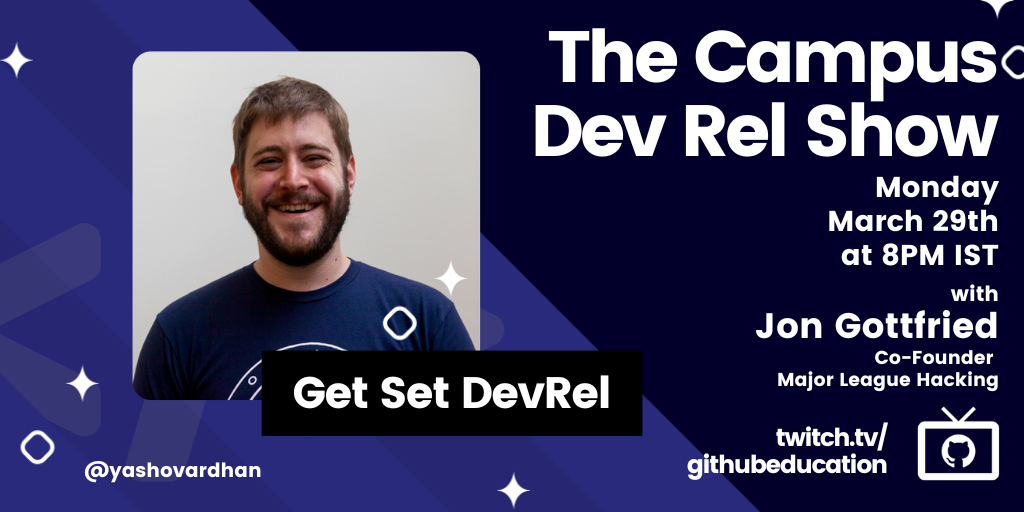Get Set DevRel - Jonathan Gottfried


Okay, first things first! Before we dive into the first episode let’s first try to understand what the term “DevRel” stands for, along with understanding what this show is all about!
Now, #DevRel stands for Developer Relations, this field has a massive spectrum per-say, for the roles involved, for the tasks to be carried out, it is something that can take various forms depending on the company and their goals. But, the one thing that you blindly trust on — developer relations is a job for folks who understand developers, who are inherently developers and can easily interact with the developer audience with the aim of catering to their needs and empowering them. That sum-up is a very small portion of it.
Coming back to our show, let’s understand why the show was started in the first place or even better, what made us, at DevRel.Page, come up with the idea.
For our host, it was interactions with #DevRel folks is what helped him to get a better understanding of the field. Once he got into the field, he saw the students having the same confusion about this field — “What is this field all about?”, “Should I get into this field?”, “Will this be a perfect career choice?”. So, his goal was to redefine that journey, that interaction, that pathway of approaching DevRel for student community leaders, demystifying the myths and vagueness around it. He wanted to help student community leaders find a space within the world of software development.The aim was to not just cover the questions or a topic of DevRel, it was to share the journey of the speaker which in many cases is the main motivating factor for anyone looking to be involved. Hence, with the help of amazing folks at GitHub Education, “The Campus DevRel Show 🔥” was born!
Without wasting any more time! Let’s dive right into the first episode of The Campus DevRel Show hosted by Yash, with guest speaker Jonathan Gottfried(Jon)!
Jon’s Story
Jon is the co-founder of Major League Hacking, who has a very unique journey, where he transitioned from being a history graduate to finding his own place in the software development field. He was always fascinated with computers right from a young age. Interestingly, while he did get into college as a part of the computer science program,he soon realized that his interest lied in building things, writing code and not particularly in research and academic side of computer science.Hence, he switched to history to make his academic life more fun, to get involved with teaching kids. But, he never left the tech side of things either, he was always able to find that balance.
How did Jon go from aiming to be a history high school teacher to becoming a developer and eventually getting into developer relations??
During a semester break, Jon was back at his home in suburban New York, when he decided to look for jobs on craigslist (not the usual goto!). He found a tech startup hiring for PHP developers, just a few blocks away from his home. It was the first startup he interacted with and played a huge part for him to get a huge chunk of knowledge. He liked that the environment was really interactive and noticing that there are folks out there passionate about building practical things with the help of technology was an eye-opener for him. According to him, his first ever hackathon was “Music Hack Day ‘’, organized by his co-worker which was a life changing experience for him.
Community building and evangelism was something that Jon was always interested in. He grew up going to summer camp and being super involved in it. He liked being involved in building communities and experiences for people. This is one of the reasons he says he wanted to be a teacher in the first place! At the Music Hack Day he met folks from a company whom he later pitched for being a part-time developer evangelist, inspired by folks themselves and how they helped organize hackathons and would live code — building apps and projects. Here comes the fun part, the very first event he went as an developer evangelist was also where he found his co-founder Swift of MLH! He then later joined Twilio as a developer evangelist after graduating, which shaped his further understanding of the field..
Jon believes it was a lot of luck along with hard-work that played out for him. He doesn’t associate himself being an innovator in developer evangelism, but rather someone who got into it by observing the people around him.
I just happened to be at the right place at the right time and meet amazing people.
Working for two years at Twilio, what did Jon learn about developer relations and what made him take a deep dive into this field?
One of the first things that Jon said was “Well.. It was my job right” 😂.
For the record, Jon joined Twilio while in college. He worked with them for six to nine months while graduating and then two years after that. His understanding of DevRel when he just started working for Twilio was to show up at hackathons, do a really cool demo and support developers throughout the weekend. While working there, he realised there was much more than that going in that background, and a lot of it was about figuring it out as he moved forward. He worked with a fantastic manager, amazing co-workers and everyone around him were creatives from non traditional computer science backgrounds. Jon mentioned they would come up with these wild ideas which his team thought would be really cool and that was the real magic of it. As a company their strategy was to build something that developers love, which also inspires them to use it! He did mention numbers, and that someone had to keep in mind on getting “X number of users”, but Jon was focused on making something that would make developers super excited. A lot of things their team did involved trial and error.
Jon made one of the first screencasts that Twilio had on their YouTube. At that time it was cool, they didn’t invent the screencast, but they were on the path to understand what the developers would like. Jon reflected back to his time at Twilio and mentioned that a huge part of discovery of what developers would like included reflecting on what he would like as a developer and building up his trust for the organization.
The story of founding MLH
Jon and Swift, both developer evangelists, became close friends, going to multiple events together, speaking at and building community meet-ups in New York. They did multiple collaborations together and ended up spending a lot of time together. The interesting part is that, one of the most frequent places they met was at student hackathons, which was still a growing thing at that time. There were a few other organizations which had just started, and they as developer evangelists were early sponsors for most of the events. Both had been working on various things together, a couple of small ideas here and there, which made them agree that they want to work together eventually. So, basically they found co-founders before they came up with an idea for a startup.
Swift then left his job and Jon still continued with his, but it was during this six months of time, when a mutual friend of theirs gave them an idea to unite all of these student hackathons together.
Fun Fact: Jon had register the domain for MLH years before they for a completely different idea 🤯
Swift then spent the next six months building a community around student hackathons which laid the foundation of MLH.
What exactly do companies look for in student communities?
Jon mentioned that the companies’ goals have changed from the time they had started. At first when MLH was just getting started, most of their sponsors were personal friends of theirs. As MLH grew it changed a lot as now they had to focus on making sure it was mutually beneficial for companies along with student communities. They figured out most of the things as they went along. For Jon, he was experienced in selling sponsorships so he managed that part of MLH, and Swift became the CEO, being an incredible leader that he is and also a huge part of MLH started by Swift by himself during the first couple months. Connections and relationships play a huge part in developer relations as a huge chunk of it is about creating meaningful relations.
What does John think is the best part about working in Developer Relations?
When you do something to help someone, just as a nice thing to do, and years later they come back and you realize how impactful it has been.
When you are into developer relations there are hundreds of interactions that you carry out as your day-to-day job. The interaction might just be a casual one for a DevRel, but that for the other person can be really impactful. That’s one of the best parts about this job — impacting people in a positive way and being able to scale that impact.
What is Jon’s advice for undergrads getting into DevRel space?
“Start with becoming a community organizer” — Jon
Attend conferences, organise hackathons, or volunteer under organisations who do the same, basically to gain the initial experience that you can showcase both, the community and the engineering side of things when you apply for a job. A little bit of experience on the marketing — blogs, videos, speaking helps too. When Jon worked at Twilio and his team would look for developer relations roles, they would often look for full-time engineers who did part-time community work because they enjoyed it. So they would approach them and basically ask them to do what they enjoyed doing, but full time!
What exciting things companies are doing for student communities right now?
“Dev.to does really cool stuff” — when it comes to folks getting started with writing about tech, Dev provides an accessible platform for doing so. Jon was personally excited about Battlesnake and their unique way of exercising creativity.
Jon’s takeaway for DevRel metrics
It is an interesting question because I’m not sure that DevRel struggles to measure success or struggles to determine what their success metrics are.
That ^ is so true, and what Jon means is that DevRel teams have so many metrics, but fail to agree on which metric is more important for measuring their success. Which category DevRel fits into is still a very debate-able question. Most would say that it depends on the company and their goals, and which team you fit in, helps in determining what your success metric will be.
The companies that have been most successful have had a mix of belief in the strategy and metrics. One has to be willing to take creative risks while proving that they’re doing something valuable, because otherwise it’s hard to justify spending money on the team.
That was literally a lot of info to get started. Make sure you take your own time to understand every piece of information to pave your path towards becoming a DevRel🤞🏻. Always remember, “It’s not a race, It’s a process.”
This wraps the first ever blog for The Campus DevRel Show 🔥.

